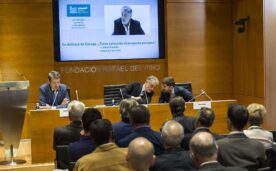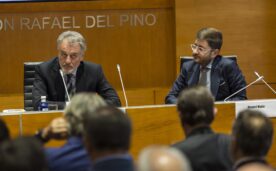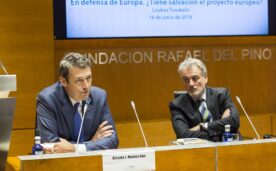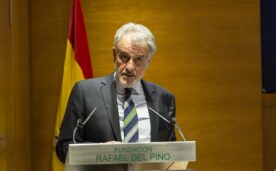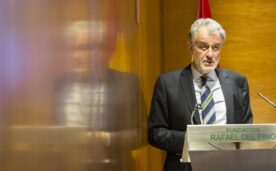Summary:
On 16 June 2016, the Rafael del Pino Foundation organised a lecture by Loukas Tsoukalis, Pierre Keller Visiting Professor at the Harvard Kennedy School, on the future of European integration. During his speech, Tsoulakis tried to answer two questions: what is wrong with the European project and what are the main challenges and options for it. The first thing he highlighted was the dramatic change in attitudes towards the European Union that has occurred since the beginning of the 21st century, when euphoria dominated the launch of the euro, the enlargement of the EU to the countries of the East and the European constitution project. The enthusiasm of that time has been replaced by pessimism and a sense of defeatism. What has gone wrong? Basically, two crises: the euro crisis and the refugee crisis. The international financial crisis turned into a euro crisis because of the poor design of the European monetary union, a pure matter of bad luck because the first litmus test for the single currency was the international financial crisis, internal divisions and the implementation of wrong policies. All this meant that the countries concerned had to pay a heavy price in terms of output, employment, indebtedness, economic divergence and political fragmentation. With regard to the refugee crisis, one issue to bear in mind is the instability of the EU's neighbouring countries, many of them losers in the globalisation process and with corrupt governments. It is in this context that key events such as the Arab spring or Russia's challenge to the "pax europea" took place. These two crises are huge crises and have reduced support for Europe. Moreover, they have been combined with an institutional crisis resulting from a continued expansion of the European project that has generated a weak centre. Moreover, these crises are taking place in a global context, that of globalisation, which has created divisions between winners and losers. In this scenario, the constraints imposed by globalisation have been confused with those imposed by the EU, and governments have taken advantage of the situation to turn the European project into a scapegoat for the problems created by them or by globalisation. From this point onwards, the European Union has increasingly been seen as divisive, bigger, more intrusive and less inclusive, in a context of slow economic growth and growing inequality. The reality that emerges from the above is that Europe has long been divided, between and within countries. Citizens' support for the European project is at historically low levels. However, they fear the consequences of disintegration. Moreover, their levels of trust in political elites are very low, while populism is on the rise. It is therefore necessary to understand the causes of discontent. The solution to Europe's problem lies in making hard choices and asking how much sovereignty is shared and for what purpose. Or to ask whether there is a link between competitiveness and inequality. Restrictions on the freedom of movement of workers should also be considered. As far as the euro is concerned, the single currency was a big mistake, at least as it was designed, but it would be an even bigger mistake to abandon it. Moreover, the problem of the democratic deficit of the European institutions must be resolved. The question, ultimately, is not whether we want more or less Europe. The question is what kind of Europe we want.
The Rafael del Pino Foundation is not responsible for the comments, opinions or statements made by the people who participate in its activities and which are expressed as a result of their inalienable right to freedom of expression and under their sole responsibility. The contents included in the summary of this conference are the result of the debates held at the meeting held for this purpose at the Foundation and are the responsibility of their authors.
The Rafael del Pino Foundation is not responsible for any comments, opinions or statements made by third parties. In this respect, the FRP is not obliged to monitor the views expressed by such third parties who participate in its activities and which are expressed as a result of their inalienable right to freedom of expression and under their own responsibility. The contents included in the summary of this conference are the result of the discussions that took place during the conference organised for this purpose at the Foundation and are the sole responsibility of its authors.
